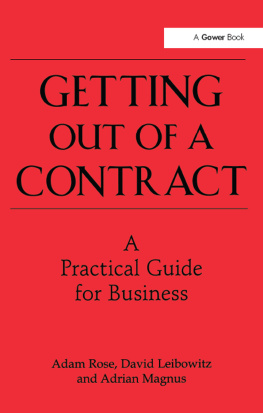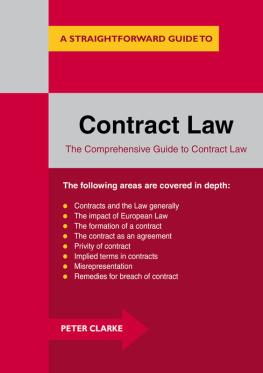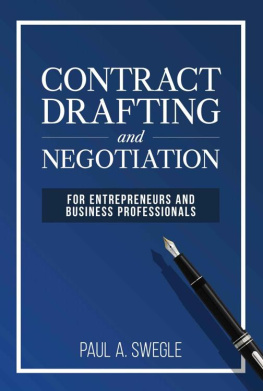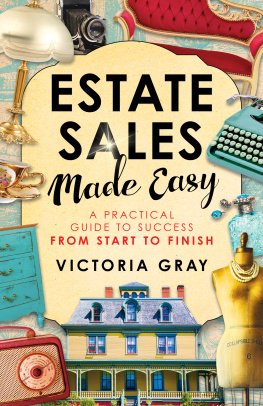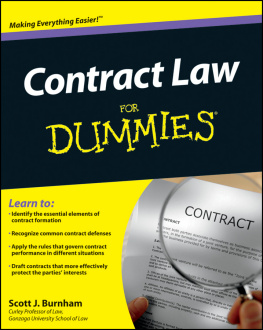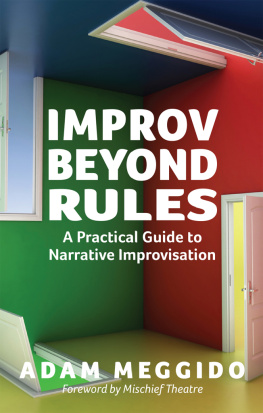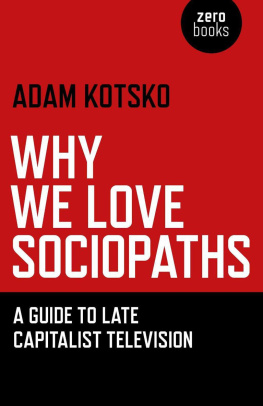Rose Adam - Getting Out of a Contract - a Practical Guide for Business
Here you can read online Rose Adam - Getting Out of a Contract - a Practical Guide for Business full text of the book (entire story) in english for free. Download pdf and epub, get meaning, cover and reviews about this ebook. publisher: Taylor & Francis Group, genre: Romance novel. Description of the work, (preface) as well as reviews are available. Best literature library LitArk.com created for fans of good reading and offers a wide selection of genres:
Romance novel
Science fiction
Adventure
Detective
Science
History
Home and family
Prose
Art
Politics
Computer
Non-fiction
Religion
Business
Children
Humor
Choose a favorite category and find really read worthwhile books. Enjoy immersion in the world of imagination, feel the emotions of the characters or learn something new for yourself, make an fascinating discovery.
- Book:Getting Out of a Contract - a Practical Guide for Business
- Author:
- Publisher:Taylor & Francis Group
- Genre:
- Rating:3 / 5
- Favourites:Add to favourites
- Your mark:
- 60
- 1
- 2
- 3
- 4
- 5
Getting Out of a Contract - a Practical Guide for Business: summary, description and annotation
We offer to read an annotation, description, summary or preface (depends on what the author of the book "Getting Out of a Contract - a Practical Guide for Business" wrote himself). If you haven't found the necessary information about the book — write in the comments, we will try to find it.
Rose Adam: author's other books
Who wrote Getting Out of a Contract - a Practical Guide for Business? Find out the surname, the name of the author of the book and a list of all author's works by series.
Getting Out of a Contract - a Practical Guide for Business — read online for free the complete book (whole text) full work
Below is the text of the book, divided by pages. System saving the place of the last page read, allows you to conveniently read the book "Getting Out of a Contract - a Practical Guide for Business" online for free, without having to search again every time where you left off. Put a bookmark, and you can go to the page where you finished reading at any time.
Font size:
Interval:
Bookmark:

GETTING OUT OF A CONTRACT
TO OUR WIVES AND CHILDREN
GETTING OUT OF A CONTRACT
A PRACTICAL GUIDE FOR BUSINESS
Adam Rose, David Leibowitz and Adrian Magnus

First published 2001 by Gower Publishing
Published 2017 by Roudedge
2 Park Square, Milton Park, Abingdon, Oxon OX14 4RN
711 Third Avenue, New York, NY 10017, USA
Routledge is an imprint of the Taylor & Francis Group, an informa business
Copyright Adam Rose, David Leibowitz and Adrian Magnus 2001
A. Rose, D. Leibowitz and A. Magnus have asserted their right under the Copyright,
Designs and Patents Act 1988 to be identified as the authors of this work.
All rights reserved. No part of this book may be reprinted or reproduced or utilised in any form or by any electronic, mechanical, or other means, now known or hereafter invented, including photocopying and recording, or in any information storage or retrieval system, without permission in writing from the publishers.
Notice:
Product or corporate names may be trademarks or registered trademarks, and are used only for identification and explanation without intent to infringe.
British Library Cataloguing-in-Publication Data
Rose, Adam
Getting Out of a Contract: A Practical Guide for Business
1. Discharge of contractsEngland. 2. Discharge of contractsWales.
I. Title. II. Leibowitz, David. III. Magnus, Adrian.
346.42022024338
ISBN 0-566-08161-X
US Library of Congress Cataloging-in-Publication Data
Rose, Adam, 1966
Getting Out of a Contract: A Practical Guide for Business / Adam Rose, David Leibowitz and Adrian Magnus
p. cm. Include index.
1. Breach of contrctGreat BritainPopular works. 2. Business lawGreat
Britain.
1. Leibowitz, David, 1960. II. Magnus, Adrian, 1963. III. Title.
KD1600.Z9.R67 2001
346.41022dc21
00063639
Typeset in Garamond light and Avant Garde Book by Acorn Bookwork, Salisbury, Wiltshire.
ISBN 13: 978-0-566-08161-3 (hbk)
CONTENTS
This book has been written by three practising solicitors, each chapter written by one of us, resulting in a different style, a different approach and a different emphasis from chapter to chapter.
Some aspects of this book are, by their very nature, prone to a more traditional exposition than others and , in particular, dealing with the recently much changed rules surrounding competition law (or, as the Americans have it, anti trust), has had to be less chatty than other chapters. But overall, chatty has been very much our guiding aim, which we hope we have achieved.
Our aim has not been to produce a textbook for the law student, but a book for those with an interest, in a commercial setting, of how the law might help or, indeed, hinder them. We have tried to make the book as accessible as possible, consistent with dealing with complex legal issues. Contract law, which is very much the cornerstone of commercial law, is not an easy subject. It is generally taught to law undergraduates in their first year of study and is an essential requirement of the training required by both the solicitors and barristers sides of the legal profession. Commercial lawyers continue to be fascinated by its details and its difficulties throughout their careers. Contract law has also shown itself to be remarkably resilient to the onward march of the new economy; the general approach of the courts has been to recognize that however a contract comes into being, traditional contract law still provides good answers. To that end, although this book is grounded in a traditional context, its principles will (generally) apply to the on-line world of e-commerce, m-commerce and whatever comes out after that.
We have, where appropriate, used case references in the traditional legal format the reader who is not used to such legal form might simply note the year of the case (which will generally be clear from the reference, sometimes in traditional brackets, and sometimes in square brackets the distinction does not matter here) and not bother with the rest of the reference; the lawyer might want to follow up the reference. In any event, we have kept to using only one or two references for a case, and not used the four or five references for the same judgement that sometimes can appear. As we have tried to say, if the reader is a lawyer needing detailed case references, or someone looking for an academic text, we will only disappoint. We have, where necessary, or appropriate, used legal terms, but our hope is that they will be clearly understood, either from the context in which they are used, or because we explain them when we use them. Our general approach has been to recognize that the law is sometimes surrounded by mystery that should not be there, and so to avoid, where we can, falling into the trap of excluding the non-lawyer from what is really going on.
The genesis of this book was a series of talks given by the authors to our clients, under the general heading of how to get out of a contract. An article followed, which was picked up by our publishers, and this book is an expansion of that.
We have, at various times, worried that others in our profession would be worried that anarchic lawyers were on the loose, threatening their livelihoods, but also encouraging contractual mayhem; after all, getting clients into contracts is surely what lawyers should be doing. We hope that we are not encouraging a free-for-all between contracting parties, but instead simply adding to the available stock of business books. And if a party wants to get out of a contract, we hope to be of some help.
As is usual with any book dealing with the law, we should address one fact head on: this book is not a substitute for taking specific legal advice, which the reader should always seek before deciding upon a particular course of action, or inaction. Instead, this book has been written with a view to helping businesspeople understand a bit more about the processes lawyers are going through when we are asked, how do I get out of a contract?; if that understanding helps business people better address how they are to act, and the context, from a legal perspective, of where they stand and what rights (or obligations) they might have, then our job in relation to this book will have been done.
We would like to thank our wives, Nicola, Gillian and Sharon, our children, Ben, Joseph, Samantha, Jonathan, Naomi, Rachel and Gideon, our secretaries, Barbara, Julie, Jenny, Janet, our trainee solicitors who, at varying times in the writing of this book, have shared our rooms and our frustrations with the time it takes to write something, which, at the outset, seemed so simple. Most of all for all her patience shown to us, well beyond the call of duty, we owe a great thank you to Jo Burges of our publishers, Gower. Without Jos regular, yet always polite, chasing messages, our clients, who seemed to have plotted to make time unavailable to us throughout the period of writing this book, would have won.
Finally, we have tried to state the law as we understand it at 20 May 2000. The authors are all qualified as English solicitors, which means that our competence is the law of England and Wales. Scottish and Northern Irish laws are different in many ways from English law, and this book is limited to the laws of England and Wales accordingly. Any errors are entirely ours, and any readers who believe that they have uncovered an error in this text are very much welcome to write to us, care of the publishers.
Font size:
Interval:
Bookmark:
Similar books «Getting Out of a Contract - a Practical Guide for Business»
Look at similar books to Getting Out of a Contract - a Practical Guide for Business. We have selected literature similar in name and meaning in the hope of providing readers with more options to find new, interesting, not yet read works.
Discussion, reviews of the book Getting Out of a Contract - a Practical Guide for Business and just readers' own opinions. Leave your comments, write what you think about the work, its meaning or the main characters. Specify what exactly you liked and what you didn't like, and why you think so.

